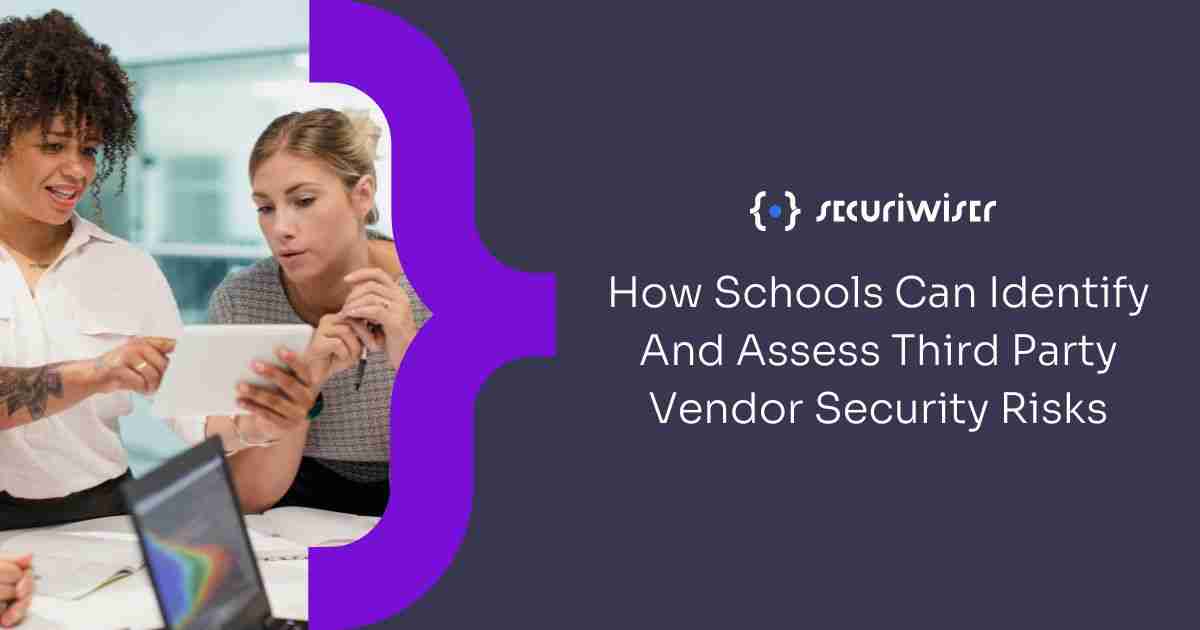How Schools Can Identify And Assess Third Party Vendor Security Risks
Blog / How Schools Can Identify And Assess Third Party Vendor Security Risks
4 MIN READ


As schools increasingly rely on technology and digital resources, it is crucial that they take steps to identify and assess vendor security risks. With sensitive student information being shared and stored on digital platforms, it is crucial that schools take the necessary precautions to ensure the security of this data.
In this blog, we will explore the best practices for identifying and assessing vendor security risks, including reviewing vendor contracts, implementing regular security audits, and more. Whether you are a school administrator, teacher, or IT professional, this blog will provide you with the information you need to keep your school's data secure.
What is a vendor risk assessment
A vendor risk assessment is a process of evaluating the security controls and policies of vendors that a school is working with, to identify and assess any potential risks to the school's sensitive information and systems. The assessment typically includes an evaluation of the vendor's security management practices, incident response procedures, and compliance with relevant regulations and industry standards.
The goal of a vendor risk assessment is to understand the vendor's security posture and identify any potential vulnerabilities that may exist. This information is then used to make informed decisions about the use of the vendor's products or services, and to take appropriate actions to mitigate any identified risks. The assessment is an ongoing process and should be regularly reviewed to stay up to date with the latest security threats and vendor risk management best practices in schools.
How to assess vendors security risks
Many schools lack the knowledge and resources to accurately assess and manage vendor security risks. This highlights the need for schools to take an initiative-taking approach to reducing vendor security risks. We’ve listed some steps you can take to assess vendor security risks.
1. Conduct a vendor risk assessment
This involves evaluating the security controls and policies of the vendors that the school is working with. The assessment should include an evaluation of the vendor's security management practices, incident response procedures, and compliance with relevant regulations and industry standards.
2. Review vendor contracts and service level agreements
These documents should outline the vendor's security responsibilities and provide information on the security controls that are in place to protect the data that the school is providing to the vendor.
3. Conduct regular security assessments and audits
Schools should conduct regular assessments and audits of their vendor relationships to identify potential vulnerabilities and take steps to address them. This can include penetration testing and vulnerability scanning to identify security weaknesses.
4. Monitor for security incidents
Schools should have incident response plans in place and monitor for security incidents that may be related to their vendors. This can include monitoring for suspicious activity on the school's network or for data breaches that may have been caused by a vendor's security weakness.
5. Communicate with vendors
Schools should have open communication with their vendors regarding security and be sure that vendors are aware of the school’s security expectations. They should also ask vendors for evidence of their security controls, such as certificates of compliance with industry standards.
It is important to note that vendor security risk assessments are ongoing and should be regularly reviewed. The technology landscape is constantly evolving and so are the potential risks, hence it is essential for schools to stay up to date with the latest security threats and vendor risk management best practices.
Tips for selecting vendors with strong security practices
When it comes to selecting vendors for schools in the UK, security should be a top priority. With sensitive student and staff data on the line, it is essential to ensure that vendors have strong security practices in place to protect this information. Here are a few tips to consider when selecting vendors for your school:
- Look for vendors that have a history of good security practices: Before making a selection, conduct research on potential vendors and look for evidence that they have implemented strong security measures. This could include encryption of data, firewalls, and intrusion detection systems. Additionally, look for vendors that have a history of successful security audits or certifications.
- Check for industry certifications: Many industry organizations, such as the National Cyber Security Centre (NCSC) offer certifications for vendors that meet certain security standards. These certifications can provide assurance that a vendor's security practices have been independently verified and are up to industry standards.
- Verify that vendors have a data protection policy: With the Data Protection Act 2018 (DPA) in place, it is crucial to ensure that vendors have a data protection policy in place that meets the requirements of the DPA. This policy should outline how the vendor will protect and use personal data in accordance with the regulation.
- Check for a dedicated security team or individual in the vendor: It is imperative to check whether the vendor has a dedicated team or individual who is responsible for managing and securing the data they are handling. This will ensure that the vendor is taking the necessary steps to protect your school's data and is able to respond to any security incidents.
- Ask for references and testimonials: Ask the vendor to provide references or testimonials from other schools or educational institutions they have worked with in the UK. This will give you an idea of their experience working with schools and their commitment to security.
By considering these factors, schools in the UK can select vendors that have a proven track record of strong security practices. This will help to safeguard sensitive student and staff data and ensure that the school is in compliance with regulations like the Data Protection Act 2018.
Steps for implementing security protocols with vendors
Schools can implement security protocols with vendors by:
- Establishing a security agreement: Schools should establish a security agreement with vendors that outlines the security responsibilities of both parties.
- Providing vendor training: Schools should provide vendors with training on how to effectively manage sensitive information and how to detect and respond to security threats.
- Regularly reviewing and updating security protocols: Schools should regularly review and update security protocols with vendors to ensure that they are current and effective.
- Monitoring for security incidents: Schools should have a process in place to monitor for security incidents and respond promptly in the event of a security breach.
- Communicating with vendors: Schools should maintain open lines of communication with vendors to ensure that any security concerns are addressed in a timely manner.
Conclusion
In conclusion, schools must prioritise security by assessing vendor risks and identifying potential vulnerabilities through vendor risk assessment. Best practices include regular security assessments and audits, reviewing vendor contracts, and communication with vendors. Additionally, schools should select vendors with strong security practices, such as industry certifications and data protection policies. Vendor security risk assessments are ongoing, so it is fundamental for schools to stay informed about the latest threats and best practices. By following these guidelines, schools can protect sensitive student information.
Sign up for a free Securiwiser account today and conduct a vendor risk assessment of your school.
Previous Article
How Private Schools Can Prevent Data BreachesHow secure is
your business?
Blog categories
How secure is
your business?